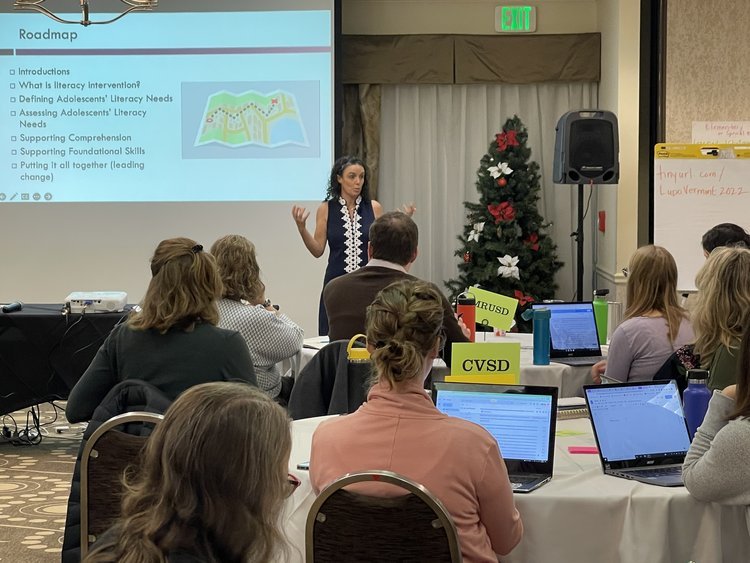Addressing Adolescent Literacy
Last year, we hosted adolescent literacy expert, Dr. Sarah Lupo from James Madison University to support teams looking for ways to improve literacy outcomes in grades 4-12. A member of the CVEDC board of directors, Kosha Patel, had seen that Dr. Lupo was bringing a strengths-based approach to the work of improving interventions at the adolescent level, with proven researched methods that work for this particular age group of students. Our educators knew that students needed something different than what they were currently implementing. We eagerly brought her to Vermont for a December 2022 session on A Strengths-Based Approach to Adolescent Literacy. She focused on how to assess and determine literacy needs of adolescent learners and shared the research behind the strategies for interventions. We had two virtual follow-up sessions. Here’s what people said:
I plan on formulating lessons around the quad text and building in vocab learning using some of the methods Sara shared. I also plan on using book groups more often to tap into the social component of reading comprehension learning and on continuing to link reading and writing skills.
I'm taking all the research findings and sharing them as well as the scaffolding guide, the quad-text set and more!
The feedback we received for next steps was that CVEDC needed to get leadership teams more aware of the strategies and schedules needed for this work so that schools could create systems that would support strong implementation. We brought Dr. Lupo back later in the year to speak to leadership teams specifically with “Developing a System for School-wide Adolescent Literacy Intervention and Supports.” We gave each team a follow-up virtual consultation with Dr. Lupo to personalize their experience and ask specific questions related to their schools. We then planned for a full year interventionist cohort for practitioners and also some full day in-person seminars to deepen their practice in FY 24. After the May event, here’s what we heard:
I appreciated the format with the many discussion breaks.
This was one of the best PD opportunities I have attended in a long time
Love the list of things to do and things to stop doing. It's refreshing to have a kind and firm no-nonsense approach.
I'm thinking a lot about using targeted diagnostic assessments. I also am thinking a lot about strategies and systems that were discussed that the research shows are NOT effective for adolescents - and how we can make shifts in my school and district to align. Also, I've been lingering on the question of how we undo the harm we may have caused through other systems of interventions.
What I liked best about this session is that it focused on the high school student. I have attended other session on MTSS, but it was always geared towards elementary and sometimes middle school. This sessions actually answered some of my questions about how to implement MTSS at the high school level
Thank you for bringing her back. It is exactly what we needed as we plan for middle school intervention
We always welcome the feedback for improvements and acknowledgements from our participants and we are looking forward to CVEDC continuing this work.
**********
This year, our series is: Adolescent Literacy Supports Beyond Core Instruction: An Evidence-Based Approach.
We have just added our famous Dine & Discuss opportunity for district and building leaders who have a team registered. To round out the offering. Dine and Discuss with Dr. Sarah Lupo: Redesigning Adolescent Literacy Supports. September 27th from 4 to 7 pm. It will be a chance for leaders who are sending a team to gather, have a wonderful dinner and learn about improved literacy instruction (even if they can’t go to the sessions with teams). They can learn more about supports, schedules and what they can do to see this be a successful improvement plan.
We have 3 full day in-person institutes that will be important information for district and school-based teams including interventionists. Sept. 28 and 29 will be focused on Supporting Students; Disciplinary Literacy Skills and Supporting Students in Supplemental Intervention. After that point, those on the team who are interventionists will have monthly hourlong virtual sessions they can work on asynchronously (video format with links and materials) and then on specific dates monthly - a live remote session with Dr. Lupo from 2-2:45 pm to follow-up, answer questions and support them. These are those dates:
Interventionist Cohort 11/14 Supporting Word Recognition with Morphology Instruction12/12 Supporting Vocabulary Development1/9 Progress Monitoring for Intervention2/13 Supporting Fluency Development3/12 Supporting Comprehension4/9 Text-Based DiscussionWe will close the series with the final whole group in-person session on May 15th, 2024: Putting It All Together: A Comprehensive Look at Multifaceted Interventions.
We know how important a comprehensive approach to professional learning is and that’s why we designed this in stages. We hope your team is registered as it is filling up. There’s still room - please let us know if you have questions.

